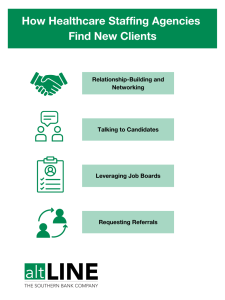Last Updated June 24, 2025
It’s no secret that the healthcare industry is facing an employment crisis. In fact, the International Council of Nurses has labeled the nursing shortage a “global health emergency,” as providers struggle to fill critical positions.
Nursing staffing agencies play a vital role during this crisis by providing healthcare facilities with qualified nursing professionals to ensure patients receive high-quality care. However, starting and growing a nursing agency can be complex and challenging, especially when it comes to securing contracts with healthcare facilities like hospitals.
Read on to discover how to get contracts for a nursing agency, including strategies for finding the right providers, how to develop and build professional relationships, and the most common questions about nursing staffing agencies.
What Is a Nursing Agency?
Nursing staffing agencies are employment agencies that specialize in matching qualified nursing professionals with job opportunities in hospitals, clinics, long-term care facilities, and other healthcare organizations. They typically partner with facilities to fill short-term, long-term, and permanent staffing needs.
How Nurse Staffing Agencies Work
As a nurse staffing agency, your organization is responsible for the following:
- Recruiting and screening potential nursing candidates
- Checking candidates’ credentials and references
- Matching those candidates with job opportunities that meet their skills and experience
- Serve as the employer of record, handling payroll, taxes, benefits, and other employment-related responsibilities
The healthcare facility pays staffing agencies a fee for the nursing services provided, and your organization pays the nurse a salary or hourly wage, along with any benefits they may be entitled to.
Healthcare organizations that need flexible staffing solutions turn to nursing staffing agencies to address staffing shortages, temporary absences, or unexpected demands. They also benefit nursing professionals who want flexibility or seek employment opportunities in a new geographic area or specialty.
How Staffing Agencies Get Contracts with Hospitals and Other Healthcare Systems
As you spend time creating a strong nursing talent network, remember to spend just as much time on client relationships and marketing your business. Balancing your efforts between client relationships and talent acquisition is challenging yet critical for your firm’s success. Here are some of the best ways to build a new client base and find staffing contracts.

1. Build Relationships Through Networking
Imperative for growing your client base, networking establishes you as a trusted provider of home healthcare services and is necessary for agencies wanting to get contracts with hospitals.
As a healthcare staffing agency owner, you should participate in conferences and events that place you in front of healthcare organizations and offer educational resources to develop yourself as an expert in the nursing and staffing field at these events (and on your website).
Connect with the healthcare professionals you meet and learn about new trends and developments in the industry. Look into joining local business and networking groups, such as chambers of commerce, to connect with other local businesses and clients (or perhaps a staffing-specific networking group). Community events like health fairs and charity events will also help in your relationship-building efforts.
2. Leverage Job Boards
While you can spend time cold-calling hospitals that post nursing jobs on job boards, there are more effective ways to find out which hospitals are open to working with agencies.
If you see another recruiting firm posting a job opening, know that they’re usually mostly unchanged from their client’s original posting. Copy part of it and paste it into a search engine to see if the same posting pops up on a healthcare organization’s website. It’s a great way to find potential clients!
3. Ask Your Candidates for Referrals
Don’t forget that your current crop of candidates and the nurses you’ve employed can be valuable resources themselves.
Leverage your nurses and candidates’ experiences to find potential clients. Ask them if they previously worked with or found jobs through nursing agencies. You can then identify the healthcare providers that worked with those agencies and pitch your own staffing agency to them.
These hospitals might be unsatisfied with their current nursing agency vendor, or perhaps they’ve since moved on from the vendor, and are open to working with new staffing and recruiting companies like yours!
4. Request Referrals from Your Best Clients
One of the most effective ways to build your client base is leveraging the ones that you have. Referrals are pre-qualified leads that make your job easier: when someone refers a client to you, they are essentially vouching for your services.
You can establish a strong reputation in your community by providing high-quality services and asking for referrals from satisfied clients. Word-of-mouth recommendations are still beneficial in today’s employment landscape. Plus, they’re more cost-effective than other traditional marketing strategies, such as advertising.
5. Research Your Competitors
Learning from your competitors is an effective way of getting more clients. It can help you find potential partners, such as complementary healthcare organizations that serve the same demographic. It also enables you to develop a pricing strategy that is competitive and attractive to potential clients.
Researching your competitors is more than discovering what methods they use to succeed. It will help you identify gaps in the market.
For example, what your competitor offers may not meet the needs of a specific demographic. You can then step in and offer your own services and specialties. You should also use your research to find a way to differentiate your services and stand out from the competition.
Types of Placement Contracts for a Nursing Agency
Nursing staffing agencies offer a variety of placement contracts to meet the specific needs of healthcare facilities and nursing professionals. As a staffing agency owner, it’s critical that you review and negotiate the terms of nursing agency contracts to ensure that your talent meets the specific needs and expectations of their future employer.
Per Diem and PRN
Per diem and PRN contracts are flexible staffing solutions for healthcare facilities. Under these two contracts, nurses are hired on an as-needed basis to fill temporary staffing shortages or cover absences.
Per diem and PRN contracts are almost the same, with one notable difference; PRN nurses are designated to work for one healthcare facility while per diem nurses can be assigned to work at various facilities at the same time.
Nurses under a per diem or PRN contract usually have a higher hourly rate than nurses with other contracts. However, are not entitled to health insurance or paid time off benefits. These contracts are ideal for nursing professionals seeking work flexibility or extra income to supplement their main income source.
Travel
Travel contracts allow nursing professionals to work in different geographic locations for a set time, usually between 8 to 26 weeks.
Nursing staffing agencies typically handle all the logistics of the travel contract, including arranging transportation and lodging. They also ensure that nurses have the necessary certifications and licenses to work in the destination state and provide support throughout the assignment.
Healthcare organizations benefit from travel nurses because these nurses are a more flexible and cost-effective alternative to hiring permanent. Travel nurses may also be utilized by hospitals that need someone with a special skill set that they don’t already have on staff, or by a hospital that is simply short on nurses.
Short-Term
Short-term contracts are typically offered for a specific duration, ranging from a few weeks to a few months. They’re ideal for facilities that need staffing support for a temporary period, such as during a full-time employee’s parental leave. Short-term contracts usually last anywhere from 6-12 weeks and include the hiring of locum tenens physicians.
Under short-term contracts, nurses are employed by the staffing agency and paid an hourly rate equal to their experience and skills. Depending on the contract terms, they may also be entitled to benefits such as health insurance, 401(k) retirement plans, and paid time off.
The staffing agency typically handles all aspects of the short-term contract, including recruitment, screening, and placement of the professional. They also provide ongoing support and management throughout the duration of the assignment. The agency provides orientation and training, scheduling and shift management tools, and access to professional development resources.
Long-Term
Long-term contracts range from several months to a year or longer. They are ideal for healthcare organizations that need ongoing support in a specific unit or department.
Under a long-term contract, nurses are employed by the staffing agency and paid an hourly rate based on their experience and skills. Nurses are also entitled to insurance, paid time off, and retirement plans.
Like short-term contracts, staffing agencies handle all the aspects of long-term contracts. They provide nurses with the training, scheduling, and tools they need to succeed.
Direct Hire
Direct hire contracts are offered when a healthcare provider wants to hire a nursing professional on a permanent basis. The staffing agency provides recruitment and screening services to help the healthcare facility find a qualified candidate. However, the provider is responsible for final hiring decisions and all employment-related responsibilities.

FAQs
How do I start a nursing staff agency?
Starting a nursing staffing agency can be a complex process, but here are some steps to get you started:
- Conduct market research. Research staffing agencies in your area and determine a target market for your agency, such as hospitals, home health agencies, or long-term care facilities.
- Develop a business plan. Create a plan that summarizes your agency’s mission, goals, and objectives. Include market analysis, competitive analysis, financial projections, and a marketing strategy.
- Secure funding. Determine the funding you need to start and run your agency, and explore options such as small business loans, grants, and venture capital.
- Obtain necessary licenses and permits. Make sure you get proper licensing and permit requirements for nursing staffing agencies in your state before launching your agency.
- Recruit staff. Hire experienced recruiters, account managers, and administrative staff to help you manage daily operations.
- Establish processes and procedures. Establish processes and procedures to help you manage client relationships, staffing assignments, payroll, and other administrative tasks.
- Leverage digital tools. Invest in technology to improve your systems. Some examples include applicant tracking systems, payroll software, and scheduling software to help you run your agency more efficiently.
A nursing staffing agency requires a considerable investment of time and money but can be rewarding and profitable with the right strategy and approach.
How do I get a staffing contract with a hospital?
It’s one of the top questions nursing agencies have: how to get a staffing contract with a hospital. Hospital staffing contracts can be complex and competitive, but the right strategies and tools can help give you an edge over the competition.
Start by researching hospitals and learning about their staffing needs, policies, and hiring processes. Identify the decision-makers, such as the director of nursing, HR manager, and chief financial officer. Build relationships with them by attending networking events, reaching out on social media, and scheduling meetings to discuss your proposal.
Once you’ve made a connection, develop a proposal outlining the staffing services you offer, including the types of nursing professionals you provide, the level of staffing support you provide, and the benefits of working with your agency. It should also have your pricing structure and terms of service.
After you’ve submitted your proposal, follow up with the decision-makers and address any questions they may have about working with your agency. Some concerns may be your reputation, experience, and compliance with healthcare regulations. It might require some negotiation over the terms of your staffing contract with the hospital. When there is an agreement between the hospital and nurse staffing agency, sign the healthcare staffing agency contract and ensure everyone understands the agreement terms.
Critical to your agency’s success is the quality of service provided once you’ve entered into a contract with them. Provide high-quality staffing services to the hospital and maintain a positive relationship with key decision-makers.
How do nursing agencies make money?
Nursing agencies charge healthcare facilities a fee for the staffing services they provide. The fee is typically based on the nursing professional’s hourly rate, and the agency takes a percentage of the rate as its fee. The percentage depends on the type of staffing contract and services provided.
In addition to staffing fees, some nursing agencies generate revenue through other services, like training, consulting, and professional development. Some agencies also provide value-added services for an additional fee, such as scheduling software, compliance monitoring, and shift management.
Jim is the General Manager of altLINE by The Southern Bank. altLINE partners with lenders nationwide to provide invoice factoring and accounts receivable financing to their small and medium-sized business customers. altLINE is a direct bank lender and a division of The Southern Bank Company, a community bank originally founded in 1936.









